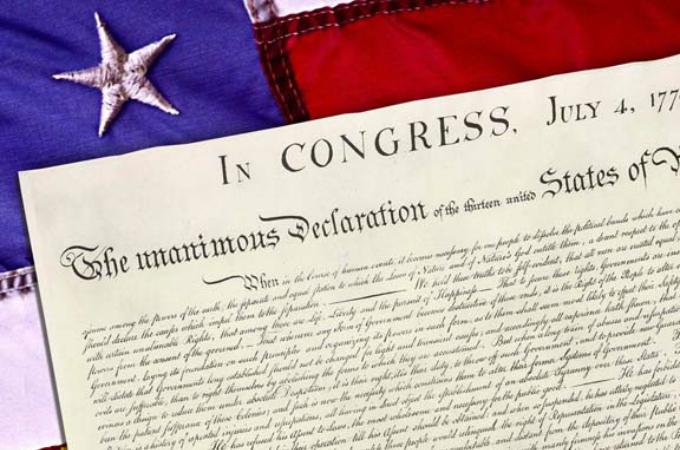Father Murray and national unity
This year marks the 60th anniversary of Father John Courtney Murray's great book reflecting on what he called "The American Proposition," entitled "We Hold These Truths." I've gone back to that book these days, during the election season, and found something surprising in it for Catholics today.
A common caricature holds that Murray was an apostle for American-style religious liberty, with its separation of church and state, against an older tradition going back to Leo XIII at least, that in a good society the government and the people would reasonably seek the establishment of the Catholic religion. On this caricature, Murray's efforts even contributed to a change in the Church's teaching in Vatican II, as seen in the Council's "Declaration on Religious Liberty," which gives much scope to freedom of religion and conscience.
I do not want to discuss the Council's "Declaration" here, except to say that it deliberately included in its opening paragraphs a "proviso," indicating that nothing from Pope Leo XIII was being retracted; also, that Murray's own view was that the "Declaration" fell short of endorsing his new approach.
Rather, I want to say something about Murray's view of national unity. Yes, "We Hold These Truths" did discuss what Murray called "pluralism of religion" in the United States. Yes, the book did regard the First Amendment as setting down something like a "modus vivendi" for religious liberty, which Murray thought was a distinctively American political contribution, when compared with past European experience.
Yet, as one may expect in the writings of an astute political theorist, Murray does not discuss pluralism without evincing an even greater concern with national unity.
It turns out that the main preoccupation of the book, reflected in its title, is with the basis of unity in a pluralistic society. For Murray, writing for a society still innocent of the Vietnam War, the sexual revolution, and Roe vs. Wade, the main source of pluralism and potential disunity was religion. But we feel additionally torn apart by culture wars, race, gender, class, and now even city vs. country, coasts vs. flyover. The problem that Murray was mainly concerned with has gotten much worse; by no means has it gone away.
For Murray, pluralism could be sustained in this country -- even the relatively benign pluralism of differences in religion -- only if there was a consensus around the "American Proposition," that is, the truths which were articulated at the Founding. The opening lines of the Declaration of Independence state well enough what these truths are: a belief in the sovereignty of God and the supremacy of his law and the conviction that we have natural rights that flow from being his rational creatures. Our unity is found in these truths.
The caricature of Murray, which I mentioned earlier, often includes the idea that Murray was an optimist. "Murray was not anyone to entertain thoughts on 'Why Liberalism Failed!'" But I found in returning to Murray's great work that this caricature, too, is grossly mistaken. Murray believed that the national consensus around the Founding truths was already problematic and unstable in his own day, not because our Founding had built-in fatal flaws, but because we no longer shared the Enlightenment's confidence in the "self-evidence" of those truths. He worries that, as these truths are no longer taught in universities, the American Proposition could be "eviscerated" in a single stroke.
(When I read those sentences, I thought: Roe vs. Wade. But more on this shortly.)
He follows up this worry with the following interesting suggestion. Murray was writing at a time when the Catholic community in America was just emerging into prosperity and prominence, after a long period of discrimination and marginalization. (This fact explains why racial discrimination is not prominent in his writings.) He is writing for an educated public, which still wonders whether being a Catholic and having higher loyalties to the Church and pope, is consistent with being a patriotic American. (John F. Kennedy rather bungled the attempt to explain why not in his Houston speech.)
But suppose the American Proposition is indeed eviscerated, Murray imagines, and it is no longer sustained by the general populace. Yet, in that day, Catholics will still believe it, because by their faith they are bound to believe what the Declaration of Independence asserts. And then we may find ourselves in a curious position, Murray observes, where the pertinent question becomes, not whether Catholics can be loyal Americans, but whether anyone except Catholics can be loyal Americans. For American Catholics will have become the sole standard-bearers of the tradition of the Founding.
Here is where a Catholic politician's stance towards abortion becomes so important. For we are living in a time in which the American Proposition has been eviscerated: whatever we may think about the intimacy of pregnancy and the privacy of abortion, as a matter of public political philosophy, the Supreme Court's holding in Roe vs. Wade rejected the view that human beings in virtue of their humanity enjoy a right to life. And Murray was right: it now becomes the specific task of Catholics to be standard-bearers.
The specifically American task for a Catholic today is, by being a witness to life, to be a witness to the truths of the Declaration. To be "pro-choice" on abortion is to abandon that task, through abandoning the faith. Although superficially inclusive, such a position hurtles us more rapidly toward disunity.
- Michael Pakaluk, an Aristotle scholar and Ordinarius of the Pontifical Academy of St. Thomas Aquinas, is a professor in the Busch School of Business at the Catholic University of America. He lives in Hyattsville, MD, with his wife Catherine, also a professor at the Busch School, and their eight children. His latest book, on the Gospel of Mark, is "The Memoirs of St Peter." His next book,"Mary's Voice in the Gospel of John," is forthcoming from Regnery Gateway.



















